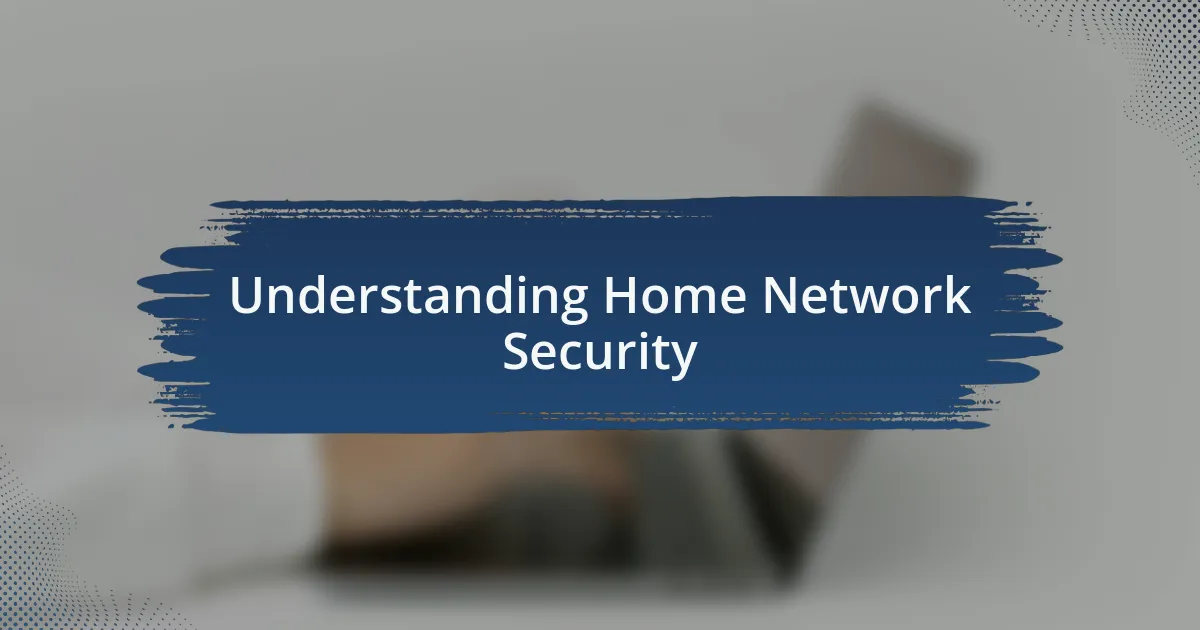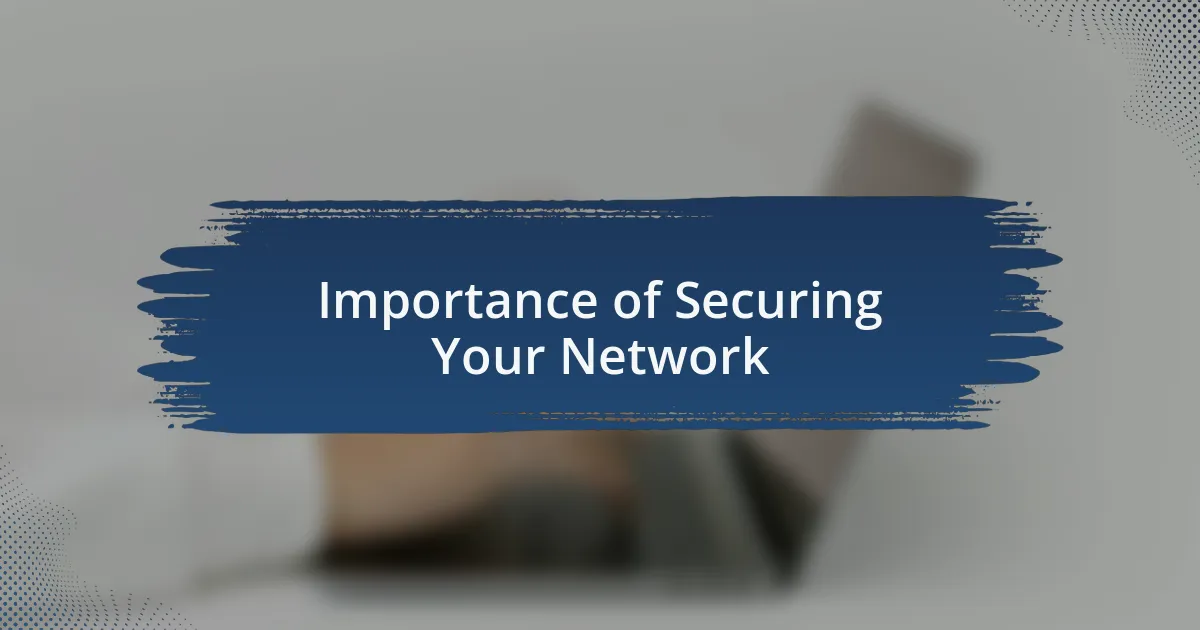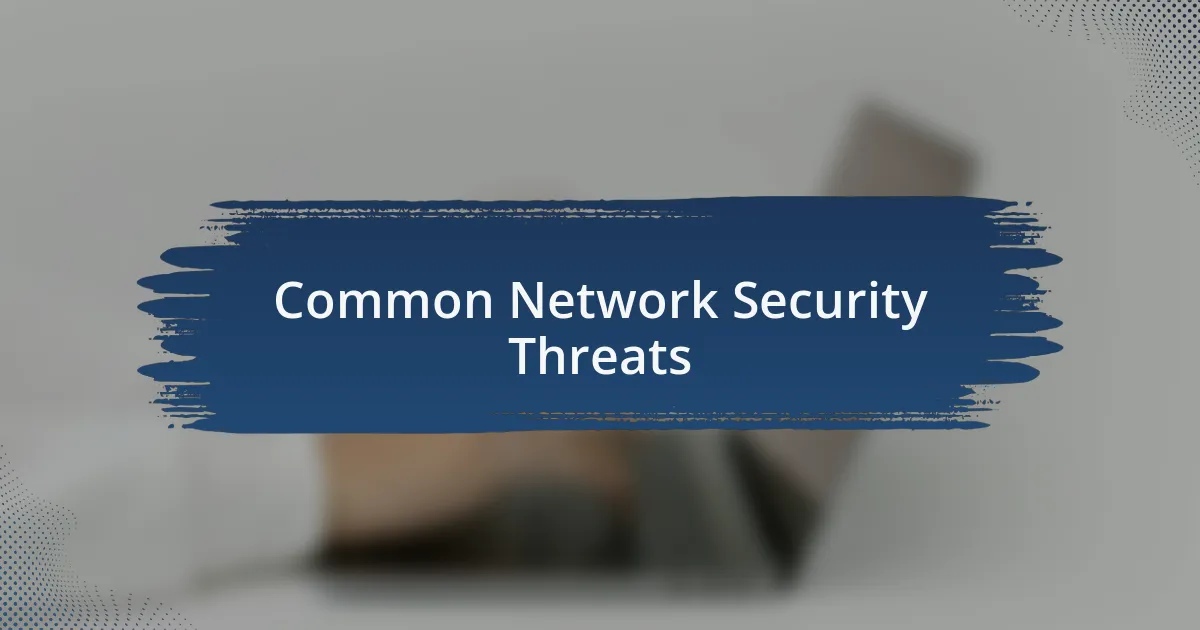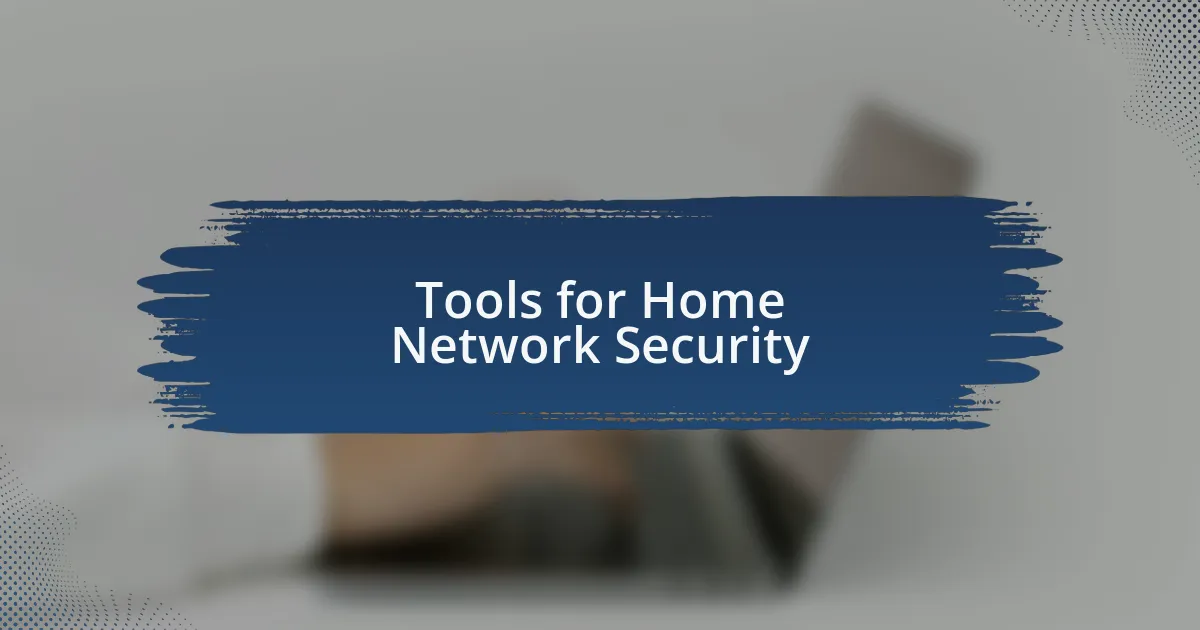Key takeaways:
- Home network security is essential to protect personal information from cyber threats and ensure family online safety.
- Regular updates, strong unique passwords, and education about cyber threats are crucial for maintaining network protection.
- Common threats include malware, phishing attacks, and unsecured Wi-Fi, highlighting the importance of vigilant security measures.
- Utilizing tools like antivirus software, network monitoring applications, and VPNs enhances the safety of home networks.

Understanding Home Network Security
When I first realized the vulnerability of my home network, it felt like an invasion of privacy was looming over me. I remember vividly the moment I learned about potential threats from devices I had connected, like my smart TV and IoT devices. This unsettling feeling pushed me to dig deeper into what home network security truly means.
It’s not just about keeping out hackers; it’s about creating a safe space for my family online. The reality is that many households underestimate the value of securing their networks. Have you ever considered what personal information could be exposed if someone accesses your Wi-Fi? This thought alone made me rethink how I approached my home network security strategy.
Implementing security measures isn’t a one-time task but an ongoing commitment. For example, I’ve made it a routine to update my router’s firmware regularly and change my passwords often. These simple steps not only improve security but also give me peace of mind, knowing that I’m actively protecting my family’s online safety. Isn’t that worth the effort?

Importance of Securing Your Network
Securing your network is crucial in a world where cyber threats are increasingly sophisticated. I remember a friend of mine who experienced a data breach because their network was left vulnerable. The emotional distress and financial consequences they faced made me realize just how imperative it is to prioritize home network security.
Think of it as locking the doors to your house. When I discovered that hackers could easily access unprotected networks, it dawned on me that without proper security measures, my personal information was hanging in the balance. Can you imagine the repercussions of exposing sensitive data, like financial details or family photos, to malicious actors?
Every device connected to your home network can serve as a potential entry point for hackers. I learned this the hard way when a simple oversight led to my smart speaker inadvertently being accessed by a neighbor’s hacker friend. This taught me that each security measure I implement—like using strong, unique passwords for each device—creates another layer of protection. Isn’t it comforting to know that these small changes can significantly enhance my family’s safety?

Common Network Security Threats
When it comes to network security, one of the most common threats I’ve encountered is malware. This malicious software can invade your system subtly, often hidden in seemingly harmless downloads. I remember downloading a free software trial only to realize later that it had installed a hidden trojan, which compromised not just my computer but also my entire home network.
Phishing attacks are another frequent issue, cunningly disguised as legitimate communication. Just last month, I received an email that looked like it was from my bank, asking me to verify my account information. Thankfully, I took a moment to scrutinize the sender’s email address, which didn’t match my bank’s official domain. Isn’t it frightening how easily we can be tricked into giving away sensitive information?
Lastly, unsecured Wi-Fi networks pose a substantial risk. I used to think my network was safe because I had a password, but I learned that using outdated encryption protocols made it vulnerable. After a deep dive into network security, I updated my settings to WPA3 encryption. This lesson taught me that vigilance is key; ensuring my wireless connection is robust creates a secure fortress against would-be intruders. How secure is your own Wi-Fi?

Tools for Home Network Security
When I set out to secure my home network, I leaned heavily on antivirus software specifically designed for network protection. One evening, after discovering a suspicious device connected to my network, I realized I needed more than just a firewall; I required a dedicated solution. This software effectively flagged unusual activity, and that peace of mind I gained was invaluable.
Another tool that I found particularly helpful was a network monitoring application. I remember spending a weekend thoroughly familiarizing myself with the app, which allowed me to see every device connected to my network in real time. It’s interesting to realize how many unknown devices can pop up; it makes you wonder—who else is using your Wi-Fi without permission?
Lastly, investing in a Virtual Private Network (VPN) changed the way I viewed my internet connection entirely. A close friend of mine, who works in cybersecurity, urged me to try it out, and once I did, I was amazed at how accessible it made secure browsing. The thought of my data being encrypted and shielded from prying eyes felt like wrapping my network in a protective cloak. Isn’t it comforting to know you have an extra layer of defense while browsing online?

Lessons Learned from My Journey
One of the biggest lessons I learned was the importance of regular updates. I used to overlook software updates, thinking they were merely minor annoyances. However, after a close call with malware that exploited an outdated application, I realized that those updates are essential—not just for security, but for the overall health of my network. Keeping everything up to date can feel tedious, but it can save a lot of trouble down the road.
During my journey, I discovered that strong passwords are non-negotiable. Initially, I relied on easy-to-remember passwords like birthdays or pet names. After reading about numerous data breaches, I decided to switch to more complex, unique passwords for each device and application. It wasn’t easy to remember at first, but using a password manager made it manageable. Isn’t it interesting how a few characters can stand between you and a potential disaster?
Lastly, I found that educating myself about cyber threats was just as important as implementing protective measures. I spent evenings reading articles and watching tutorials about the latest trends in home network security. This newfound knowledge not only empowered me but also confirmed a comforting thought: being informed is the best defense. It’s a game changer when you feel in control rather than vulnerable.